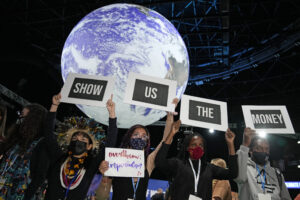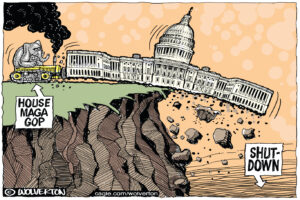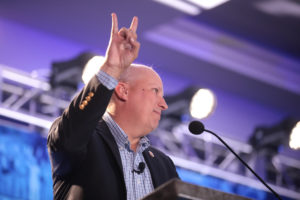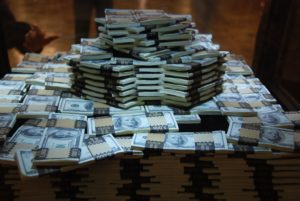Economic Death and Millionaire Taxes
For most of us, Benjamin Franklin's words in 1789 still apply: "Nothing is certain but death and taxes." However, millionaires, by definition, are not most of us.For most of us, Benjamin Franklin’s words in 1789 still apply: “Nothing is certain but death and taxes.”
However, millionaires, by definition, are not most of us. While they can’t stave off the grim reaper, they can convince lawmakers to shield them from the taxman and balance budgets on the backs of everyone else.
That’s what’s going on in revenue-starved states right now: governors are preparing to slash middle-class programs and are resisting calls to raise taxes on the wealthy. Nowhere is this class war more pronounced than in New York — the home of the financial thieves who killed the economy. Having halved its top tax rate over the last three decades, New York today faces a $15.4 billion deficit. In response, Gov. David Paterson, a Democrat, might have asked his state’s Gordon Gekkos to pay higher taxes, especially considering the idea’s popularity in polls and the news that Wall Street’s elite are still swimming in money. Indeed, according to CBS News, the allegedly beleaguered financial industry is so flush with cash it plans to dole out $14 billion in executive bonuses this year.
Yet, far from forcing robber barons to pay their fair share, Paterson told The New York Times that taxing millionaires is “the last place you want to go.” Instead, he proposes to punish Joe and Jane Six-pack by hiking the taxes and cutting the programs that disproportionately impact them. Specifically, he wants to increase sales taxes, college tuitions and licensing fees and slash education and low-income health programs.
Paterson defended his proposals by telling PBS’s Bill Moyers “that when you tax the wealthy in the downturn of an economy, you have an automatic link of a loss of job opportunities and then a loss of population.” The rationale sounds intelligently pragmatic — until you peruse the relevant data.
When New Jersey recently raised taxes on the wealthy, Princeton University researchers found that most of those who later left the state moved to places with higher taxes, meaning there is no causative link between levies on the rich and residential flight. Likewise, when New York temporarily raised high-income taxes after 9/11, the state added 127,000 jobs, meaning no link exists between higher taxes on the rich and job loss.
During times of surpluses, governors could get away with the unsubstantiated nonsense Paterson is peddling. But now, 43 states confront shortfalls, and because states cannot run deficits, the dollars and sense of these arguments matter. Lawmakers must choose what policy will create the best chances for economic recovery: spending cuts or tax increases, and if the latter, on whom?
The answer isn’t rocket science. As Nobel prize-winning economist Joseph Stiglitz says, “Reductions in government spending on goods and services (are) likely to be more damaging to the economy in the short run than tax increases focused on higher-income families.”
That’s because government cuts automatically decrease the consumptive spending programs that broadly stimulate the economy whereas tax increases, when aimed at the wealthy, more often impact funds socked away in savings. “The more that the tax increases (are) focused on those with lower propensities to consume (i.e., the rich),” Stiglitz notes, “the less damage is done to the weakened economy.”
Incredibly, Paterson acknowledges how destructive his budget is, admitting that his own “education cuts are draconian, the health care cuts are prohibitive [and] the taxes that are being levied … are not fair.”
So why would he — or any governor — nonetheless try to legislate such idiocy? Because millionaires are the ones who finance gubernatorial candidacies, and their campaign contributions buy tax protection. The result is what another New York royalist promised.
“Only the little people pay taxes,” said Leona Helmsley — a doctrine that will exacerbate this recession if states keep making it true.
David Sirota is the bestselling author of the books “Hostile Takeover” (2006) and “The Uprising” (2008). He is a fellow at the Campaign for America’s Future and a board member of the Progressive States Network — both nonpartisan organizations. E-mail him at [email protected].
© 2008 Creators Syndicate Inc.
Your support matters…Independent journalism is under threat and overshadowed by heavily funded mainstream media.
You can help level the playing field. Become a member.
Your tax-deductible contribution keeps us digging beneath the headlines to give you thought-provoking, investigative reporting and analysis that unearths what's really happening- without compromise.
Give today to support our courageous, independent journalists.









You need to be a supporter to comment.
There are currently no responses to this article.
Be the first to respond.